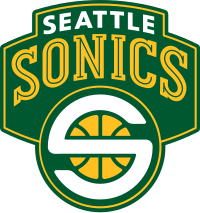
Back سياتل سوبرسونيكس Arabic سياتل سوبرسونيكس ARZ Sietl Supersoniks Azerbaijani Сіетл Супэрсонікс BE-X-OLD Сиатъл Суперсоникс Bulgarian Seattle SuperSonics BS Seattle SuperSonics Catalan Seattle SuperSonics Czech Seattle SuperSonics Danish Seattle SuperSonics German
| Seattle SuperSonics | ||||
|---|---|---|---|---|
 | ||||
| Conference | Western (1970–2008) | |||
| Division | Western (1967–1970) Pacific (1970–2004) Northwest (2004–2008) | |||
| Founded | 1967 | |||
| History | Seattle SuperSonics 1967–2008 Oklahoma City Thunder 2008–present[1][2] | |||
| Arena | Seattle Center Coliseum/KeyArena at Seattle Center (1967–1978, 1985–1994, 1995–2008) Kingdome (1978–1985) Tacoma Dome (1994–1995) | |||
| Location | Seattle, Washington | |||
| Team colors | Green, gold, white[3] | |||
| General manager | Full list | |||
| Head coach | Full list | |||
| Ownership | Sam Schulman (1967–1983) Barry Ackerley (1983–2001) Basketball Club of Seattle (Howard Schultz, Chairman) (2001–2006) Professional Basketball Club LLC (Clay Bennett, Chairman) (2006–2008) | |||
| Championships | 1 (1979) | |||
| Conference titles | 3 (1978, 1979, 1996) | |||
| Division titles | 6 (1979, 1994, 1996, 1997, 1998, 2005) | |||
| Retired numbers | 6 (1, 10, 19, 24, 32, 43) | |||
| ||||
The Seattle SuperSonics (commonly shortened to Sonics) were an American professional basketball team based in Seattle. The SuperSonics competed in the National Basketball Association (NBA) as a member of the Western Division (1967–1970), and later as a member of the Western Conference's Pacific (1970–2004) and Northwest (2004–2008) divisions. After the 2007–08 season ended, the team relocated to Oklahoma City, where they now play as the Oklahoma City Thunder.
Sam Schulman owned the team from its 1967 inception until 1983. It was then owned by Barry Ackerley until 2001, when it came under ownership of Basketball Club of Seattle, headed by Starbucks chairman emeritus, former president and CEO Howard Schultz. On July 18, 2006, Basketball Club of Seattle sold SuperSonics and its Women's National Basketball Association (WNBA) sister franchise Seattle Storm to Professional Basketball Club LLC, headed by Oklahoma City businessman Clay Bennett.[4] The NBA Board of Governors approved the sale on October 24, 2006, and finalized it seven days later, at which point the new ownership group took control.[5][6] After failing to find public funding to construct a new arena in the Seattle area, the SuperSonics moved to Oklahoma City before the 2008–09 season, following a $45 million settlement with the city of Seattle to pay off their existing lease at the KeyArena at Seattle Center before it expired in 2010.[7]
The SuperSonics played their home games at KeyArena (originally the Seattle Center Coliseum) for 33 of the franchise's 41 seasons in Seattle.[8] In 1978, the team moved to the Kingdome, which they shared with Major League Baseball (MLB) team Seattle Mariners and National Football League (NFL) team Seattle Seahawks. The team returned to the Coliseum in 1985, and temporarily moved to Tacoma Dome for the 1994–95 season while the Coliseum was renovated and renamed KeyArena.
The SuperSonics won the NBA championship in 1979. The franchise won Western Conference titles in 1978, 1979 and 1996; and six divisional titles—their last being in 2005—five in the Pacific Division and one in the Northwest Division. The franchise attained a 1,745–1,585 (.524) regular season win–loss record,[9] as well as a 107–110 (.493) playoff win–loss record during its time in Seattle.[citation needed] Both marks would rank in the top half of the NBA's all-time standings. Settlement terms of a lawsuit between the city of Seattle and Clay Bennett's ownership group stipulated SuperSonics' banners, trophies and retired jerseys remain in Seattle; the nickname, logo and color scheme are available to any subsequent NBA team that plays at KeyArena subject to NBA approval, and their franchise history, however, would be shared with the Thunder until a new NBA team in Seattle arrives.[10][11][12] On September 17, 2024, in the midst of rumors of Seattle getting an NBA expansion team, ESPN reported that "if a team were to return to Seattle, the Thunder would cede the Seattle history back to the SuperSonics."[13]
- ^ "Franchise History–NBA Advanced Stats". NBA.com. NBA Media Ventures, LLC. Retrieved May 13, 2024.
- ^ "NBA.com/Stats–Oklahoma City Thunder seasons". Stats.NBA.com. NBA Media Ventures, LLC. Retrieved December 2, 2022.
- ^ "Sonics Unveil New Logo and Official Colors". SuperSonics.com. NBA Media Ventures, LLC. August 25, 2001. Archived from the original on December 18, 2001. Retrieved June 18, 2016.
- ^ "Basketball Club of Seattle Announces Sale of Sonics & Storm". SuperSonics.com. NBA Media Ventures, LLC. July 18, 2006. Archived from the original on July 19, 2006. Retrieved July 19, 2006.
- ^ "NBA Board of Governors Approves Sale of Sonics & Storm". SuperSonics.com. NBA Media Ventures, LLC. October 24, 2006. Archived from the original on November 8, 2006. Retrieved May 7, 2016.
- ^ Allen, Percy (October 24, 2006). "NBA board approves sale of Sonics, Storm". The Seattle Times. Retrieved October 24, 2006.
- ^ Brunner, Jim; Chan, Sharon Pian (July 2, 2008). "Sonics, city reach settlement". The Seattle Times. Retrieved July 2, 2008.
- ^ Aldridge, David (December 13, 2010). "Two years later, pain of losing Sonics still stings Seattle". NBA.com. NBA Media Ventures, LLC. Archived from the original on July 12, 2019. Retrieved May 7, 2015.
- ^ "NBA & ABA Team Index". Basketball-Reference.com. Retrieved May 27, 2022.
- ^ Allen, Percy (October 24, 2006). "NBA board approves sale of Sonics, Storm". The Seattle Times. Archived from the original on May 22, 2015. Retrieved October 24, 2006.
- ^ "The Professional Basketball Club, LLC and City of Seattle Settlement Agreement" (PDF). www.seattle.gov. August 18, 2008. Retrieved October 16, 2017.
- ^ "Details of settlement between Bennett, Seattle revealed". ESPN.com. August 20, 2008. Retrieved May 7, 2015.
- ^ "NBA expansion FAQ: Cities, draft, teams and the league's future". ESPN.com. September 17, 2024. Retrieved September 17, 2024.